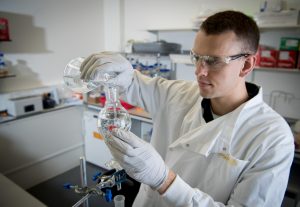A granular adsorbent capable of the specific binding and removing of target micro-pollutants, including pesticides, pharmaceuticals, high performance chemicals and heavy metals, from wastewater has won the prestigious Armourers and Brasiers Venture Prize award for materials science.
The Armourers and Brasiers’ Company is a leading supporter of Materials Science education and research in the UK. Its Venture Prize is aimed at helping scientists commercialise the early stage research and the exploitation of new and exciting ideas. The Company also seeks to encourage education in science from primary to postdoctoral levels supporting schools and universities throughout the UK.
Perfluorinated Compounds (PFCs) are common in Aqueous Film Forming Foams (AFFFs) used for firefighting and can also be found in fluoropolymer coated cookware, sports clothing and medical equipment. They are amongst the most stable organic compounds and are highly persistent in the environment.
The health threat posed by PFCs has prompted many countries to lay down more stringent regulations to the discharge of these compounds. This is evidenced by recent moves by both the EU through the Environmental Quality Standards Directive and in the U.S. through the Environmental Protection Agency.
Search plastics, additives, and more
Prospector® allows you to search, compare, and filter thousands of plastics materials from hundreds of global suppliers. Register today!
CustoMem, founded in 2015 by two Imperial College London graduates, Henrik Hagemann and Gabi Santosa, has been awarded the £25,000 Venture Prize by the Armourers and Brasiers Company. The company is based at Imperial College’s Incubator area and supported by SynbiCITE, the Royal Academy of Engineering, Innovate UK, and Climate–KIC.

“Although industrial micro-pollutants comprise only a small percentage of total pollutants, their complex chemistries prevent them from being effectively dealt with by current waste water treatment methods. This renders freshwater unusable and contributes to water stress that will affect 47 percent of the world’s population by 2030,” explained CEO Hagemann. “One such class of micropollutants includes Perfluorinated Compounds (PFCs), which pose a substantial health problem as they are highly toxic to humans and animals.”
CustoMem has combined its leading expertise in biomaterials and synthetic biology to create CustoMem Granular Media (CGM), a novel bio-adsorbent that can selectively capture micro-pollutants, like PFCs, with 10 times faster binding kinetics and double the adsorption compared with traditional adsorbent materials like anion-exchange media and granular activated carbon.
CGM, once saturated, can be regenerated at least five times. The captured pollutants can be removed with a proprietary wash and safely disposed of or repurposed.
PFCs in Teflon
The U.S. has decided to restrict the use of a chemical employed in the manufacture of Teflon. In 2015, the United States Environmental Protection Agency (EPA) issued stricter limitations on the use of long-chain perfluorinated chemicals (PFCs), traditionally employed in the manufacture of non-stick pans.
Perfluorooctanoic acid (PFOA), linked in laboratory animals to an increase in tumours of the liver, pancreas and testicles, and reduced fertility, is one of the chemicals used in the chain of reactions that makes the common non-stick surface Teflon. The EPA says long-chain PFCs accumulate in people and wildlife and, while there is less clear evidence of harm to humans, it does not want to take chances. The agency has already told companies to phase out these chemicals by the end of 2015.
However, Teflon, despite its link to long-chain PFCs, is thought to be safe, because part of the manufacturing process involves heating the coating to high temperatures, which gets rid of PFOA before the pan reaches the assembly line. A study published in the journal Food Additives and Contaminents1 tested 26 non-stick cookware products under extreme conditions and concluded that none of them released any noxious chemicals.
What has been reported from Teflon use is a risk of fumes from overheating pans, giving people temporary flu-like symptoms and sickness – known as polymer-fume fever. These fumes do not contain any PFOA and are mostly noxious to pet birds.
The new adsorbent will be particularly relevant at commercial airports, oil and gas operations and at military installations where there are significant micro-pollutants. CustoMem’s CGM is pertinent to navy and air force bases where AFFFs for firefighting are indispensable for safety reasons. CGM can treat these industries’ industrial waste water and help restore legacy contamination sites.
CGM is designed and manufactured through a sustainable biological production route that does not rely on or produce any hazardous chemicals and reduces energy consumption. It enables a circular economy and reduces energy of operation upon implementation.

“CGM is cost-effective and designed to drop-in to existing infrastructure. This avoids the need to install expensive treatment processes and will augment water recycling and reclamation on local and industrial scales,” explained Hagemann. “We are initially targeting the PFCs treatment market worth $1.6bn in Europe and the U.S. However, CGM can also address hazardous wastewater from other industries including mining, pharmaceuticals and textiles.”
“This pioneering development looks to harness nature’s capacity to make biomaterials which will promote human health and provide a solution to a key environmental issue,” said Professor Bill Bonfield, chairman of the judging panel. Bonfield, now 80, is Emeritus Professor of Medical Materials in the University of Cambridge.
Alongside Bonfield on the judging panel were Cambridge-based Materials Scientist Professor Sir Colin Humphreys, representatives from the venture capital industry, and members of the Armourers and Brasiers’ Company.
“Our prize looks to encourage entrepreneurship in materials science and provide funding to help developments like this realise their potential,” observed Bonfield. “The £25,000 prize will enable CustoMem to better characterise and test the technical performance of CGM for removing PFCs from waste water in industrially relevant conditions."
Reference:
The views, opinions and technical analyses presented here are those of the author or advertiser, and are not necessarily those of ULProspector.com or UL Solutions. The appearance of this content in the UL Prospector Knowledge Center does not constitute an endorsement by UL Solutions or its affiliates.
All content is subject to copyright and may not be reproduced without prior authorization from UL Solutions or the content author.
The content has been made available for informational and educational purposes only. While the editors of this site may verify the accuracy of its content from time to time, we assume no responsibility for errors made by the author, editorial staff or any other contributor.
UL Solutions does not make any representations or warranties with respect to the accuracy, applicability, fitness or completeness of the content. UL Solutions does not warrant the performance, effectiveness or applicability of sites listed or linked to in any content.



Leave a Reply or Comment